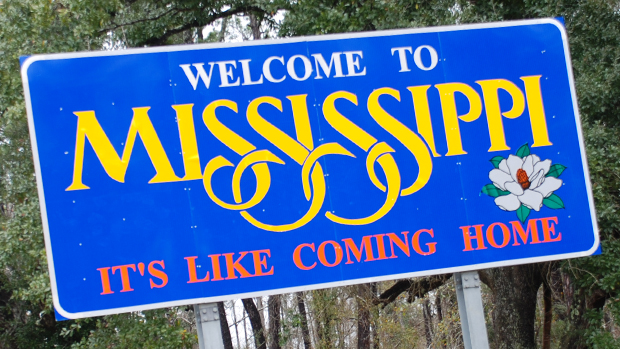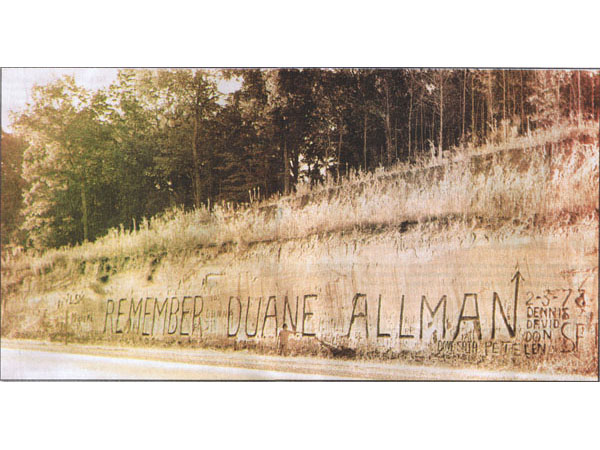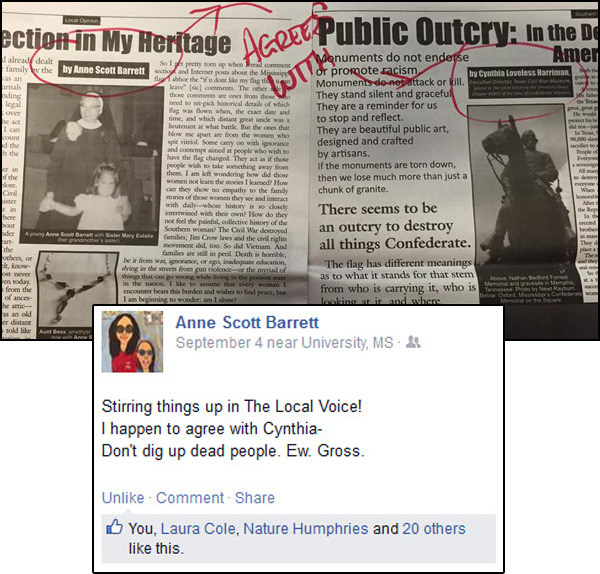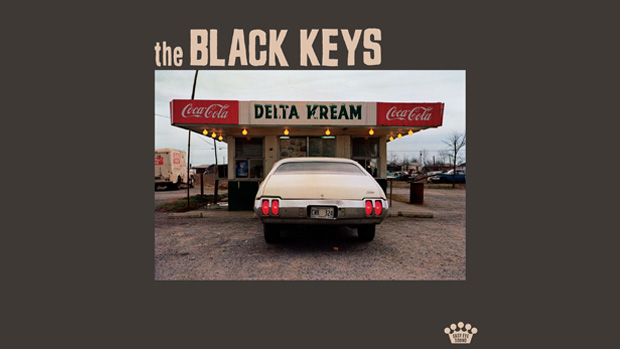
GEDSC DIGITAL CAMERA

I’m fairly certain my grandmother had already dealt with the impact of the Civil War on our family by the time I came along in 1969. Maybe it was an ongoing process for her. She wrote in journals every day and I would often catch her standing next to her blue chair, flipping through a legal pad—her version of a journal—going back over something she had written. I understand the act of reviewing one’s thoughts, especially since I can click back to the day I opened a Facebook account and read all the items I’ve posted. I understand the act of review and the sensation of growth with the cringe of “who was I?”
I spent my summers with my grandmother in Yazoo City, located a short drive along the end of the hills to Vicksburg where we would go to explore. Our drives included her re-telling stories of the Civil War that had been passed on to her and her sister who was a nun who lived in the convent in Vicksburg. Some were about the secret caves where families hid during the siege, and some were about how the nuns hid the wounded in dungeons under the convent. The stories were harrowing and heartbreaking and always told from the perspective of the women who waited for their sons, husbands, brothers or fathers to come home. The agony those women felt, knowing that those men never came home – with most never properly buried—is something I carry with me even today.

In her house, my grandmother had family relics from the Civil War period, furniture and old photographs of ancestors and hidden treasures she would fish out of the attic—and many are in my own home today. There was an old writing kit that belonged to her aunt and another distant aunt’s necklace – Aunt Bess. Aunt Bess’ story was told like this: When she was a baby at Auburn Plantation in Washington County, slaves set the house on fire and Bess was the first to cry out, waking the family and saving everyone. There was never any anger directed at the slaves in the story; we all knew why they set the house on fire.
Growing up in the 70s many of us were fed a diet of Sesame Street and “giving the world a Coke and keeping it company.” Everything was groovy and Black was Beautiful and we tried not to litter and start forest fires. We were supposed to get along and enjoy each other. Diversity was cool, man. In Vicksburg, someone carefully carved “Remember Duane Allman” into one of the Yazoo clay outcrops alongside the highway near the cemetery.
 I grew up in a world that celebrated diversity. The people that came before me were still digesting the civil rights movement but, for a little kid during that time, life was generally about celebrating culture and cultivating respect for others. My grandmother worked as a grant writer for the Head Start programs in Yazoo City back then and the office was run by a tight knit group of women of various ages, colors, religions and handicaps. They were modern women of Mississippi, working in some very high stress situations to serve the undeserved. I admired them. They didn’t care what you looked like or what your background was: they were there to help. I was their child, and they were my Mamas. I learned their stories and those became part of my heritage, too. From tales of ancestors in hoop skirts to tales of ancestors in slave ships, their collective pride and anguish all mixed together to become valuable lessons for me to carry and share along with those stories from my own family.
I grew up in a world that celebrated diversity. The people that came before me were still digesting the civil rights movement but, for a little kid during that time, life was generally about celebrating culture and cultivating respect for others. My grandmother worked as a grant writer for the Head Start programs in Yazoo City back then and the office was run by a tight knit group of women of various ages, colors, religions and handicaps. They were modern women of Mississippi, working in some very high stress situations to serve the undeserved. I admired them. They didn’t care what you looked like or what your background was: they were there to help. I was their child, and they were my Mamas. I learned their stories and those became part of my heritage, too. From tales of ancestors in hoop skirts to tales of ancestors in slave ships, their collective pride and anguish all mixed together to become valuable lessons for me to carry and share along with those stories from my own family.
So I get pretty torn up when I read comment sections and Internet posts about the Mississippi flag. I abhor the “if u dont like my flag than u can leave” [sic] comments. The other side of those comments are ones from those who need to nit-pick historical details of which flag was flown when, the exact date and time, and which distant great uncle was a lieutenant at what battle. But the ones that blow me apart are from the women who spit vitriol. Some carry on with ignorance and contempt aimed at people who wish to have the flag changed. They act as if those people wish to take something away from them. I am left wondering how did those women not learn the stories I learned? How can they show no empathy to the family stories of those women they see and interact with daily—whose history is so closely intertwined with their own? How do they not feel the painful, collective history of the Southern woman? The Civil War destroyed families; Jim Crow laws and the civil rights movement did, too. So did Vietnam. And families are still in peril. Death is horrible, be it from war, ignorance or ego, inadequate education, dying in the streets from gun violence—or the myriad of things that can wrong while living in the poorest state in the nation. I like to assume that every woman I encounter bears this burden and wishes to find peace, but I am beginning to wonder: am I alone?
Heritage is liquid. It flows and rushes and picks up things while depositing things it can no longer carry. The stories passed on to us should be constantly reviewed and studied for clues as to who we are now. I believe that, as a State, Mississippi can no longer carry the burden of the Confederate flag. Our heritage is not lost by changing our flag. It is polished and renewed. It is about the Present—and the Future—taking control. It is a review of our Past with an eye toward a collective history, not one fractured and disjointed.
One of the greatest lessons I take away from the women in my life—women of all colors and backgrounds who honor the past while being wise in the present—is that you must not throw away something that is broken. You must fix it, for a fixed thing is a loved thing.
 I see myself and others who wish to have the flag changed as people who truly love Mississippi. We have no intention of throwing away anyone’s heritage. We recognize the right to fly any flag you wish on your personal property and the right to tell the tales the way you want to. We have reviewed and reflected and recognize that, as a whole, much of it is broken but we nevertheless want to carefully fix this loved thing we call Mississippi. Changing the flag is just a small step we have to take.
I see myself and others who wish to have the flag changed as people who truly love Mississippi. We have no intention of throwing away anyone’s heritage. We recognize the right to fly any flag you wish on your personal property and the right to tell the tales the way you want to. We have reviewed and reflected and recognize that, as a whole, much of it is broken but we nevertheless want to carefully fix this loved thing we call Mississippi. Changing the flag is just a small step we have to take.
Anne Scott is a local artist and mother, distant niece of Aunt Bess and men who fought for the Confederacy as well as a multiple-great granddaughter of Joseph Marshall Walker- 13th Governor of the State of Louisiana. ![]()
–




Well said. Well said indeed. I was ambivalent until now.
Best letter on this topic I have seen so far. Something this good needs to be seen by every member of the legislature and the Governor.
The simple answer to all this flag controversy, at least to me, is to return to the original state flag and be done with it. The Magnolia flag has a real connection to Mississippi history without having been used by hate groups. Each side can walk away with a win and our state can unite under one banner. However, I don’t think the legislature has enough sense or backbone to seek this kind of compromise. I know for sure Governor Bryant and Lt. Governor Reeves aren’t smart enough to even consider the Magnolia flag and that’s a real shame.